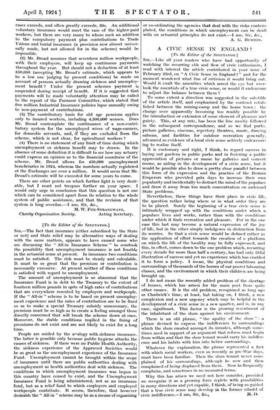A CIVIC SENSE IN ENGLAND ?
[To the Editor of the SPECTATOR.] SIR,—Like all your readers who have had opportunity of watching the recurring ebb and flow Of civic enthusiasm, I read with interest the article contributed in your issue of February 23rd, on "A Civic Sense in England ? " and for the moment wondered what line of criticism it would bring out. Would it exalt the amenities which arrest the eye but over- look the essentials of a true civic sense, or would it endeavour to adjust the balance between them ?
To some extent a direction was suggested in the sub-title of the article itself, and emphasized by the contrast estab- lished between the mining-camp and the home town ; the change over apparently becoming too readily possible by the introduction or extension of some element of pleasure and gaiety. This, at any rate, has been the line mostly followed in the subsequent correspondence, and so we find parks, picture galleries, cinemas, repertory theatres, music, dancing saloons, and facilities for outdoor recreation generally, advanced as evidence of a local civic sense actively endeavour- ing to realize itself.
It is customary and right, I think, to regard success in laying out gardens in public parks and in fostering a public appreciation of pictures or music by galleries and concert rooms, as aiding in the development of a civic, sense, but it would be possible also to draw a pretty close parallel between this form of its expression and the practice of the Roman Emperors who provided gala days to increase their own popularity and incidentally to distract the mind of the populace and draw it away from too much concentration on awkward State problems.
Nevertheless, these things have their place in civic life, the question rather being where or in what order they arc to be placed. Surely the beginning of a true civic sense is intimately wrapped up with the conditions under which a populace lives and works, rather than with the conditions under which it finds recreation and pleasure. For in the one case this last may become a natural expression of the joy of life, but in the other simply indulgence in distraction from its worries. So that a civic sense would be defined rather as the application of effort towards the creation of a platform on which the life of the locality may be fully expressed, and this, in effect, comes down to the one problem which, recurring every decade for more than half a century, has had only fitful illustration of success and yet no experience which has enabled it to form a policy. I mean, the physical conditions and surroundings of thousands of the homes of our poorer labouring classes, and the environment in which their children are being brought up.
I do not mean the recently added problem of the shortage of houses, which has arisen for the main part from quite other causes. It is the old problem, recognized as long ago as Chadwick's time, at least, but taking on, I think, a new complexion and a new urgency which may be helpful in the development of a civic sense in a new quarter, and is, in any case, significant. This factor is the growing resentment of the inhabitant of the slum against his environment.
There is an old phrase, " the apathy of the slum "—a phrase devised to express the indifference to surroundings which the slum created amongst its inmates, although some- times used in support of an argument that reform must begin from within and that the slum tenant would carry his indiffer- ence and his habits with him into better surroundings.
Whatever the explanation, the phrase represented a fact with which social workers, even so recently as pre-War days, must have been familiar. Then the slum tenant never com- plained of his surroundings, although he now and then complained of being displaced from them. Now he frequently complains, and sometimes in no measured terms.
Why this has arisen we need not here consider, provided
we recognize it as a growing force replete with possibilities in many directions and yet capable, I think, of being so guided that a true civic sense may develop in the former citadel of civic indifference.—I am, Sir, &c., M. D.


























































 Previous page
Previous page